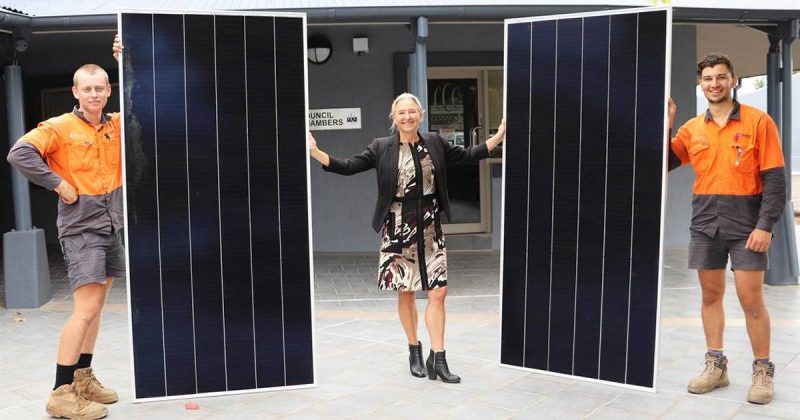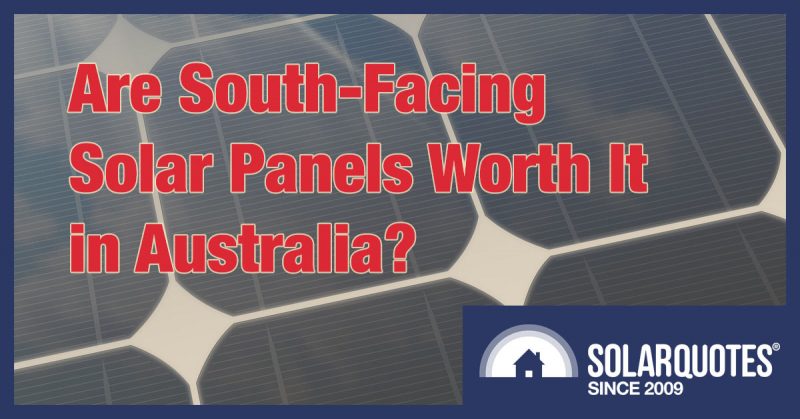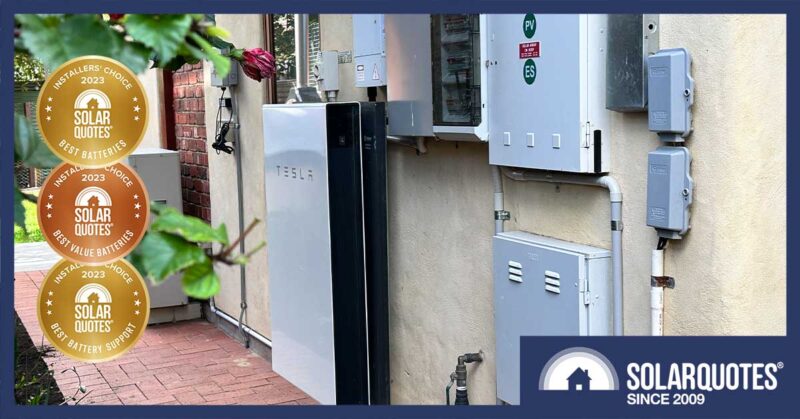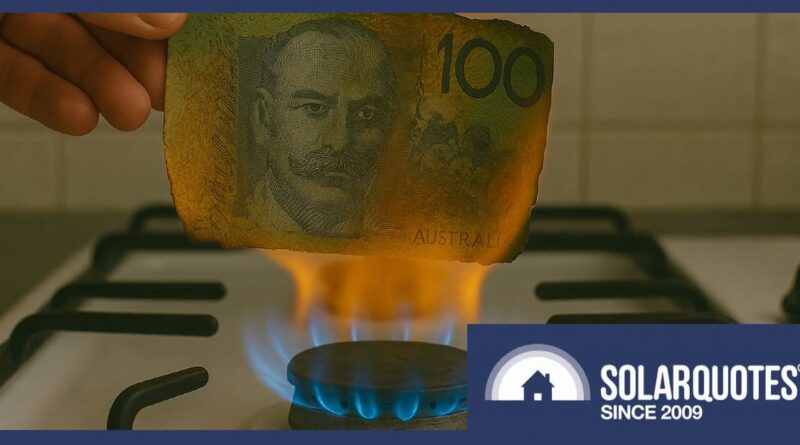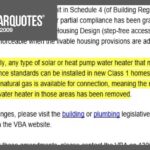Like Money? Get Off Gas.
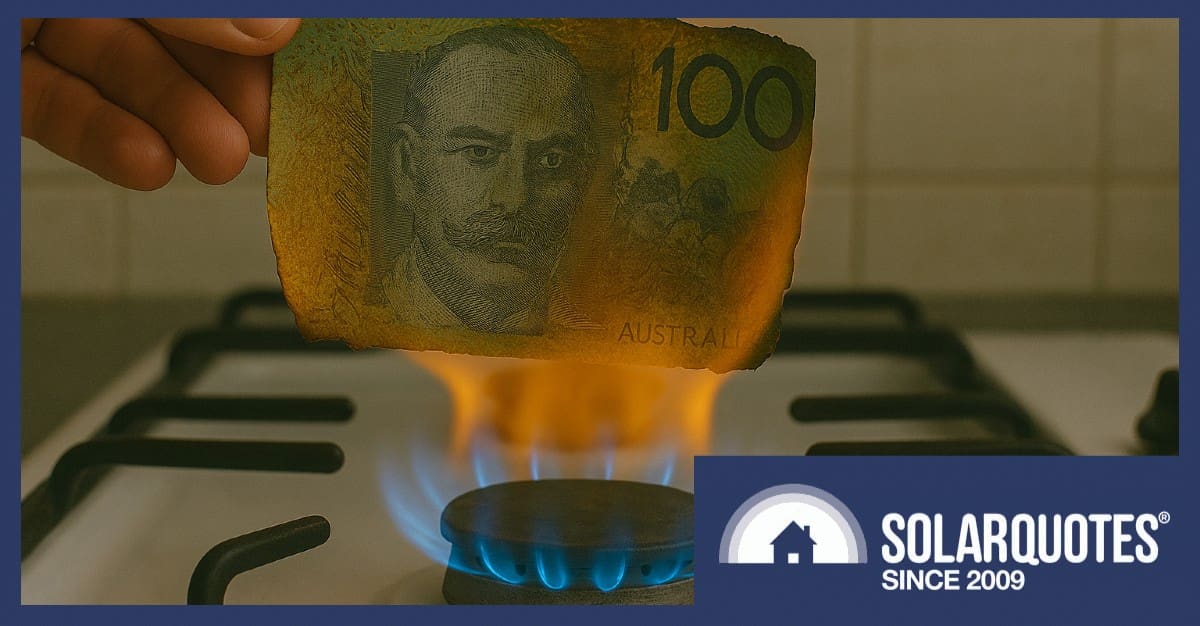

It seems every second word from politicians and the media this election campaign is all about how Australia should double down on supposedly cheap gas. I’ve taken a deeper look at how much money Australian households could actually save by getting off gas, and the amount will make your head spin worse than a leaky stovetop.
There are currently over 5 million Australian homes with gas connections. The number that would be financially better off if they stopped using gas is, by my calculations, over 5 million.
If you have solar there’s nowhere you won’t eventually be better off, and batteries can make it even better. Without solar, the only place that’s a bit iffy is WA. But their state government there has locked in gas price rises for the next 4 years, so it’ll get less iffy over time. If you rent, it’s difficult to get off gas without landlord assistance, but so long as you’re not paying to upgrade your landlord’s property, you’ll also save money.
I’m only going to discuss savings on energy bills. But if you care about your family’s health — or you’re a bastard and only care about your own — you’ll also want to get off gas because it’s a major health hazard that would never be approved for home use if introduced today.
How Quitting Gas Saves Money
Having your gas permanently disconnected or abolished saves money in 4 main ways:
- No more gas supply charges.
- It’s normally cheaper to run appliances off electricity — especially reverse-cycle air conditioning and heat pump hot water.
- Solar lowers the cost of electricity for households and batteries allow solar energy to be used at night.
- No need to pay for regular safety checks of gas appliances. (The 3 or 4 Australians who do this will save heaps.)
While you will need to pay for replacement electric appliances, for most households this investment will pay for itself within a time period that’s more than acceptable.
Total Savings From Getting Of Gas
How much you’ll save from giving up gas depends on where you are, how many gas-burning appliances you have, and how much you use them. While I can’t give a precise figure, I can give an estimate of how much a 2 to 3 person household will save by giving gas the boot. The kWh figures I’ve given below for each gassy capital are daily averages for end-use thermal energy, with colder locations using more energy for hot water and home heating.
Annual cost savings from electrifying home heating, hot water, and cooking are given first, followed by the supply charge and then the total for households that use gas for all three and give it all up.
| Solar Home | No Solar | |
|---|---|---|
| Home Heating 3kWh | $180 | $160 |
| Hot Water 4kWh | $215 | $115 |
| Cooking 0.5kWh | $55 | $45 |
| Supply Charge | $310 | $310 |
| Total Savings | $770 | $630 |
| Solar Home | No Solar | |
|---|---|---|
| Home Heating 2kWh | $155 | $130 |
| Hot Water 3kWh | $185 | $120 |
| Cooking 0.5kWh | $70 | $60 |
| Supply Charge | $255 | $255 |
| Total Savings | $665 | $565 |
| Solar Home | No Solar | |
|---|---|---|
| Home Heating 5kWh | $360 | $300 |
| Hot Water 5kWh | $260 | $195 |
| Cooking 0.5kWh | $70 | $60 |
| Supply Charge | $320 | $320 |
| Total Savings | $1,010 | $875 |
| Solar Home | No Solar | |
|---|---|---|
| Home Heating 5kWh | $160 | $135 |
| Hot Water 5kWh | $150 | $65 |
| Cooking 0.5kWh | $25 | $20 |
| Supply Charge | $360 | $360 |
| Total Savings | $695 | $580 |
| Solar Home | No Solar | |
|---|---|---|
| Home Heating 3kWh | $40 | $20 |
| Hot Water 4kWh | $80 | -$20 |
| Cooking 0.5kWh | -$5 | -$15 |
| Supply Charge | $90 | $90 |
| Total Savings | $205 | $75 |
| Solar Home | No Solar | |
|---|---|---|
| Home Heating 3kWh | $135 | $120 |
| Hot Water 4kWh | $165 | $80 |
| Cooking 0.5kWh | $40 | $25 |
| Supply Charge | $260 | $260 |
| Total Savings | $600 | $485 |
This estimate makes Canberra the capital with the greatest financial benefit from going all-electric. This is partly due to cold winters resulting in high gas consumption. The next best place to give up gas is Adelaide.
The capital with the lowest financial benefit from going off gas is Perth. A solar household will only save around $220 a year, while a non-solar household will only save around $75. If you currently have instant gas hot water and a gas connection in WA and no solar, I can understand if you think saving $75 a year isn’t worth the cost of investing in a heat pump hot water system. But the way to fix this is to get solar. Not only will you save money on your electricity bills, it will also make going off gas worthwhile.
If you don’t own a roof or there’s some other reason you can’t get solar, then I still recommend giving up gas. While the savings for non-solar WA homes aren’t high, they’ll only increase as gas prices rise. If you pay for gas appliance inspections, you’ll also save money on not needing them. And if you don’t, you’ll gain the benefit of reduced fire and explosion risk. If you get rid of gas, especially gas stoves, you’ll also be removing a major health risk from your home.
Below, I’ll go into more detail about how I calculated the above figures, and in a future article I’ll explain how much less efficient gas appliances really are.
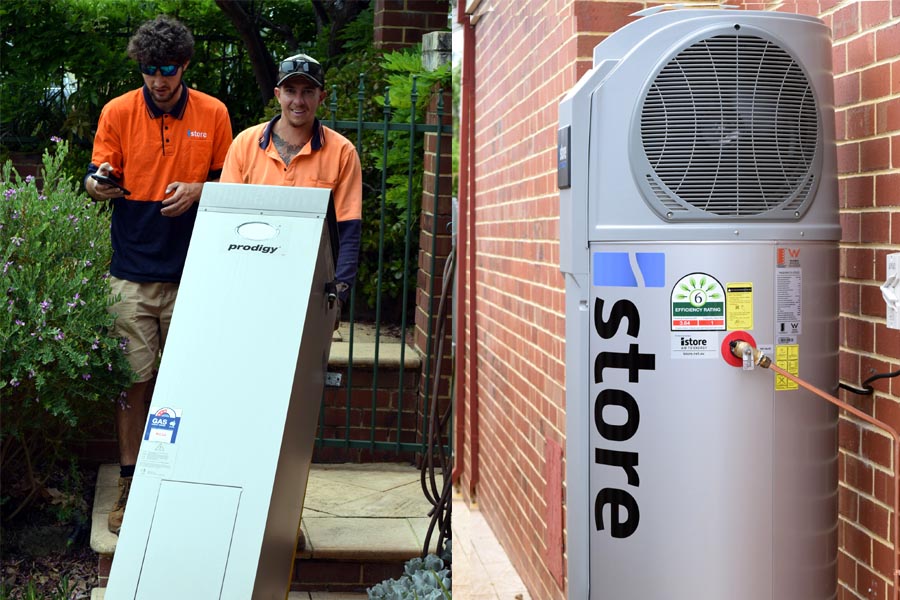
Replacing your gas hot water with a heat pump is one of the key steps to severing your costly gas connection.
Supply Charges By Capital
Supply charges are what you have to pay for a gas connection, regardless of how much gas you use — even if it’s none at all. To work out the annual cost of gas supply charges, I used the lowest-cost gas plan I could find with a quick search. While you may be able to find a cheaper plan, the figures I’ve used are likely to be around the best you can get. Annual gas supply charges are:
- Adelaide: $310
- Brisbane: $255
- Canberra: $320
- Melbourne: $360
- Perth: $90
- Sydney: $260
Most households that quit gas entirely will be around $300 a year better off purely though not having to pay supply charges. The exception is for gas connections in WA where supply charges are far lower than anywhere else. WA has the nation’s lowest gas prices because the state government there reserved a portion of production for domestic use when gas export facilities were opened. Something that wasn’t done on the east coast. Despite this, the WA government has allowed gas prices to rise and has locked in future price increases.
Gas Prices
In addition to supply charges, retailers also have the nerve to make you pay for gas used. In most states, they charge per megajoule (MJ) — a measure of the thermal energy released when gas is burned. In WA you pay per “unit”. Each of these is 3.6MJ, which is the amount of energy in 1 thermal kilowatt-hour (kWh). If an electric resistance heating element uses 1kWh of electricity, it will produce 1kWh of thermal heat. These elements are found in electric kettles, conventional electric hot water systems, and electric space heaters.
Here’s what you can expect to pay per MJ and per thermal kWh on a lower-cost gas plan:
- Adelaide: 5.6c/MJ 20.2c/kWh
- Brisbane: 6.2c/MJ 22.4c/kWh
- Canberra: 5.3c/MJ 19.2c/kWh
- Melbourne: 3.2c/MJ 11.7c/kWh
- Perth: 2.4c/MJ 8.6c/kWh (unit)
- Sydney: 4.6c/MJ 16.5/kWh
Melbourne and Perth have much lower gas prices than other cities, while it’s most expensive in Brisbane and Adelaide.
If you compare the cost of 1kWh of thermal heat from gas to 1kW from an electric heating element using grid electricity, gas looks pretty good. But the comparison is not that straightforward. One reason is — in most cases — gas is less energy efficient at heating than a basic electric heating element.
Savings With Solar
If only grid electricity is used, giving up gas makes good financial sense everywhere except WA. But if you have rooftop solar it makes sense throughout Australia, thanks to the low cost of solar power. If an appliance uses a kWh of solar electricity that otherwise would have been sent into the grid, all that’s lost is the solar feed-in tariff. Most feed-in tariffs are low these days. For most homes in WA they’re only 2c before 3pm.
Solar and home heating: If you don’t have a battery it’s difficult to run home heating off only solar. The 2 main reasons why are:
- it’s usually coldest when it’s dark and/or cloudy.
- Most Australian homes have horrible insulation.
If our homes were insulated like they are in Finland, those with large solar systems could probably heat them with close to 100% solar energy. A home well insulated by Australian standards might manage 50%. But I’ve assumed only 25% of home heating will be powered by solar.
Solar and heat pump hot water: Most heat pump hot water systems have a built-in timer, allowing them only operate during times solar output is likely to be high. Thanks to their low power draw, a reasonably large solar system can let them run almost entirely off solar energy. Conventional electric hot water systems can also be put on a timer, but because they draw more power, they’re more likely to also use grid electricity. I’ve assumed a solar home can run a heat pump hot water solar system off 80% solar energy.
Solar and induction cooking: The amount of cooking that can be powered by solar varies wildly between households. Some cook a main meal in the middle of the day while others barely cook a thing while the sun is up. Cooking also uses large amounts of power for short periods which makes it likely some grid energy will be used unless solar output is high. I’ve assumed only 20% of cooking is solar powered.
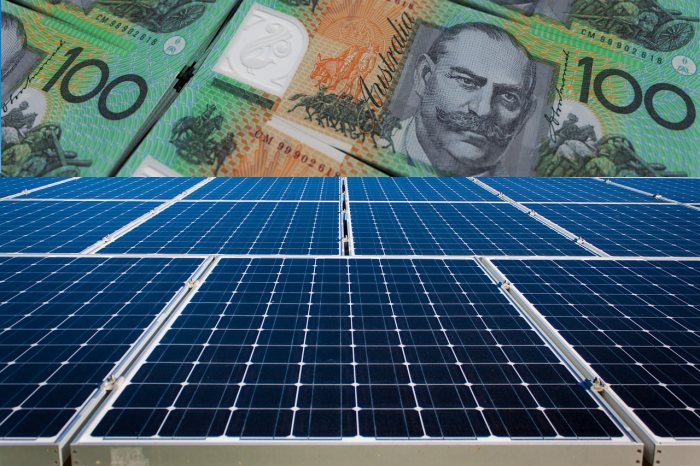
Homes with solar panels can save the most money by getting off gas.
Reduced Maintenance & Safety Check Costs
If you ask people who do safety checks on gas appliances, they’ll generally say you should have them done every 2 years. In Victoria, it’s a requirement for rental properties to have a biannual inspection. However, apart from Victorian landlords, I don’t know anyone who actually does this. Instead, most people do nothing until they start asking each other, “Hey, can you smell gas?”
Fortunately, because we have strict regulations on making gas smell really bad, people almost never ask, “Hey! Will you stop lying unconscious on the ground and tell me if you can smell gas?”
If you’re one of the 4 or 5 people in Australia who have their gas appliances checked every 2 years then going off gas will save you plenty of money. But if you’re one of the many people who never do a thing until there’s an obvious problem, then you’re not going to save money by not having something you never have done not done. But there’s still a cost to not having regular gas appliance inspections. It’s an extremely small but still extremely real chance that one day your home will decide to explode.
Cheaper Insurance
It’s also possible to save money on home insurance by giving up gas. This is because your home is safer without it. But it may be easier to get a lower rate from another company than to directly negotiate a lower rate with your current insurer.
Bottled Gas
In addition to over 5 million homes with gas connections, there’s around 1.5 million homes using bottled LPG, often only used for cooking. I won’t go into bottled gas except to say it’s even more expensive than piped natural gas. If you’re only cooking with it, get an induction stove instead. You’ll save money and have a better cooking experience.
Do Not Make This Key Mistake
When supply charges are included, gas is so expensive even those who have just bought a new gas appliance are normally better off giving it up. So if nothing else, please allow me to bang one piece of advice into your brain…
Don’t buy new gas appliances!
There’s no point in paying for new gas gear when the sooner you give it up the sooner you’ll start saving. When old appliances need replacing it should always be gas out and electric in. If you’re not going to get off gas immediately you still need to prepare for the future.
Because it no longer pays, the number of homes kicking gas to the gutter will only increase. If we get a national battery incentive this will supercharge the process, as a gas connection makes zero sense with a home battery. Once enough people go all electric, domestic gas lines will be shut down because there won’t be enough users to cover costs. So even if you don’t want to give up gas, eventually gas will give up you.
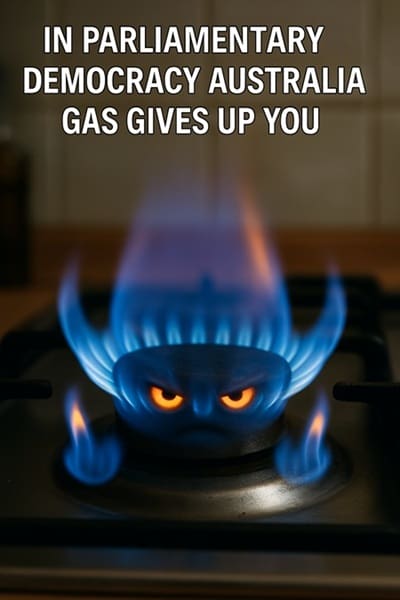

How To Give Up Gas
You may find that while the parts of your brain dedicated to long-term planning can clearly see you’ll be better off going off gas, some of the the short-term parts may still throw a tizzy over the cost of replacing gas appliances with modern electric ones. So it’s a good thing there’s assistance available in several states and a territory. The ACT, NSW, SA, TAS, and VIC all provide help in the form of grants and/or zero interest loans to purchase heat pump hot water systems or other efficient electric appliances. You can find outlines of these schemes and links to more information on this page.
Of course, if that still doesn’t motivate you enough, you can just disconnect from gas and then scramble to get electric appliances. If you do it at the start of summer you may not even feel the need for a hot water system until autumn rolls around.
If you do go ahead and quit gas, just make sure to do it the right way, or your savings might be eaten up by the fees the gas companies try to hit you with on the way out — read my guide on how to keep exit fees to a minimum.
Original Source: https://www.solarquotes.com.au/blog/like-money-get-off-gas/
